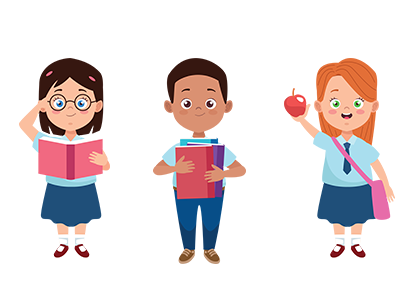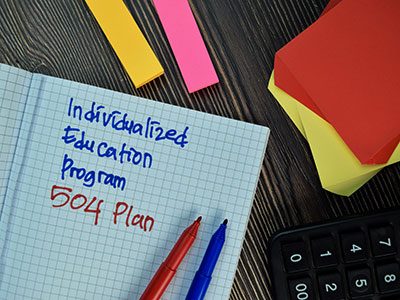Navigating the educational system can be an overwhelming and challenging experience for parents and families of children with special needs. Individualized Education Program (IEP) and the 504 Plans are among some of the most important tools available for families of students with special needs to ensure academic success and well-being. It is important to understand the unique differences between each plan, as they are governed by different laws and provide varying levels of support. Understanding these distinctions and how they impact learning in school is of particular importance for parents, educators and students.
What is an IEP?
An Individualized Education Program (IEP) is a plan developed for students who qualify for special education services under the Individuals with Disabilities Education Act (IDEA). The IEP is a comprehensive document that outlines the specific educational needs of the student and the services the school will provide to meet those needs. All students who receive special education services have an IEP. The development of an IEP entails the involvement and collaboration of multiple parties including special education and general education teachers, school psychologists, parents of students and other school personnel.
Key components of an IEP
- Eligibility: To qualify for an IEP, a student must have one of the 13 disabilities listed in IDEA, which impacts their ability to learn in a general education setting.
- Assessment: The IEP process begins with a thorough assessment, typically referred to as a psychoeducational evaluation, to identify the student’s strengths, weaknesses and specific needs.
- Goals and objectives: The IEP includes measurable annual goals tailored to the student’s unique learning needs. These goals are reviewed annually. Monthly or quarterly progress reports are also required.
- Services and supports: An IEP includes a description of the special education services, accommodations and modifications the student will receive, such as speech therapy, occupational therapy or modified curriculum. Details on specialized supports such as the level of individualized instruction and services such as modified coursework, one-on-one support and specialized teaching instruction are described in this section.
- Progress monitoring: The IEP outlines how the student’s progress will be tracked and reported to parents.
What is a 504 Plan?
A 504 Plan is developed under Section 504 of the Rehabilitation Act of 1973. It is designed to ensure that a student with a physical or mental impairment has equal access to education and is protected from discrimination. 504 plans are typically available to students who have a broader range of disabilities. Unlike the IEP, a 504 Plan does not require the student to need special education services but does require the student to have a disability that substantially limits one or more major life activities, including learning.
Key components of a 504 Plan
- Eligibility: Students qualify for a 504 Plan if they have a physical or mental impairment that substantially limits one or more major life activities, including learning.
- Accommodations: The 504 Plan outlines accommodations that will help the student access the general education curriculum, such as extended time on tests, preferential seating and assignment modifications.
- Implementation: 504 Plans are typically less complex and entail a less formalized process. They are implemented by collaboration between school personnel and parents.
- Progress monitoring: Regular review of a 504 plan should be completed. However, the reviews are typically less frequent and not as detailed when compared to an IEP.
Understanding the differences between IEPs and 504 Plans is essential for ensuring that students with disabilities receive the appropriate support to thrive in school. IEPs and 504 plans are vital resources in promoting an inclusive and equitable education system. Both parents and educators can play an important role in advocating for the needs of students to ensure their overall well-being and success in school.
 https://riseandshine.childrensnational.org/wp-content/uploads/2025/09/teacher-and-student-feature.jpg
300
400
Danielle Robbins
https://riseandshine.childrensnational.org/wp-content/uploads/2017/11/childrens_riseandshine_logo.jpg
Danielle Robbins2025-09-18 14:08:472025-09-18 14:08:47Embracing making mistakes
https://riseandshine.childrensnational.org/wp-content/uploads/2025/09/teacher-and-student-feature.jpg
300
400
Danielle Robbins
https://riseandshine.childrensnational.org/wp-content/uploads/2017/11/childrens_riseandshine_logo.jpg
Danielle Robbins2025-09-18 14:08:472025-09-18 14:08:47Embracing making mistakes





















I am a school nurse and would very much like to share rise and shine with student parents and with some of the teachers as well.The majority of my students are Latino who speak Spanish and also their parents.
Do you have Spanish versions of the rise and shine offerings? I hope so. Rise and shine sends out very good information and I would recommend it to all parents.
Hi! Thanks for reaching out. Unfortunately we do not have Rise and Shine articles in Spanish.